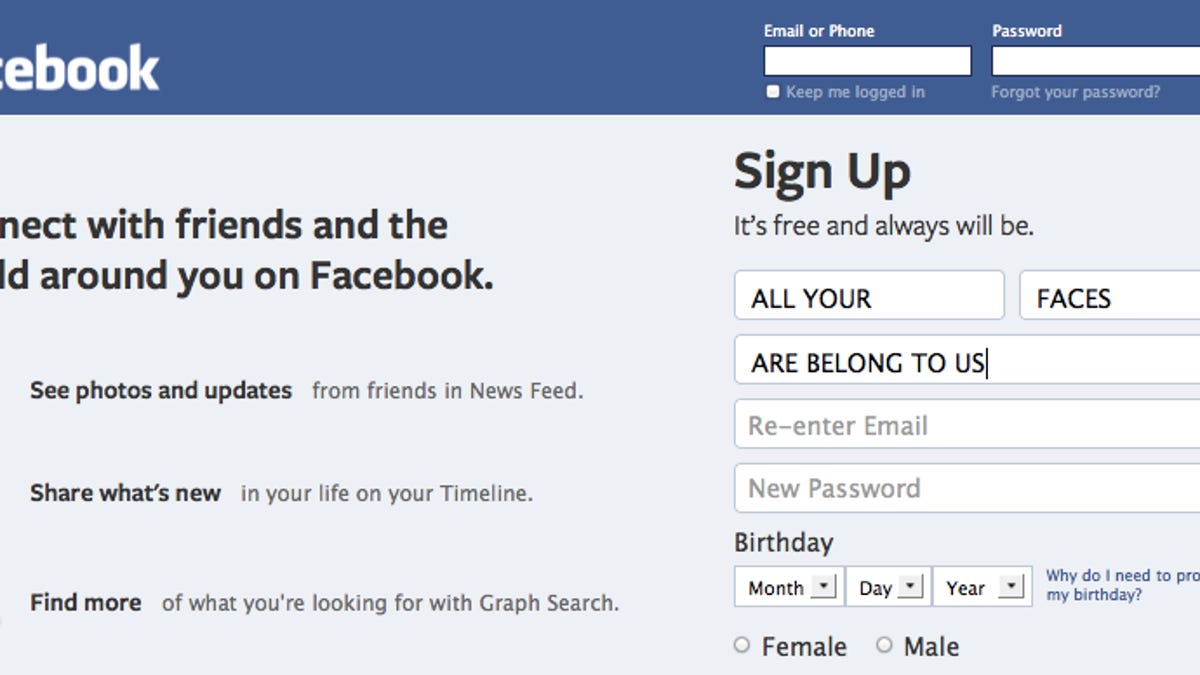Why should you trust Google, Facebook more than the NSA?
Is there any greater reason to believe that companies to which we give our information every day will guard it more preciously than any government?

"We want to be really, really clear that whenever you give us information, we're going to take it."
These aren't the words of some suede-shoed government spy, trying to put an honest face on an inherently sneaky job.
No, these were uttered by Erin Egan, Facebook's chief investigations officer -- I am sorry, Facebook's chief privacy officer -- on introducing yet more (and allegedly clearer) elucidations of the company's legendarily clear privacy policy.
Facebook intends to make more use of facial recognition technology in order to, well, identify you better. (For itself and therefore advertisers.)
You might translate Egan's words as: "We're going to use everything you give us to make money. How could you possibly think otherwise, silly?"
All your faces are belong to us. But, trust us.
Still, it's not as if Facebook is alone in such escapades.
Last Thursday, Google was in a San Jose court explaining very politely that of course it has every right to not only scan every e-mail you send via Gmail -- but also every e-mail that's sent to your Gmail account.
As the Associated Press reports, Google's lawyer offered to the very famous Judge Lucy Koh: "All users of email must necessarily expect that their emails will be subject to automated processing."
Sean Rommel, the attorney opposing Google, insisted: "The injury is two-fold: the privacy invasion and the loss of property. Google is taking people's property because they can get it for free as opposed to paying for it."
Google's lawyer described it as "inconceivable" that everyone wasn't aware that Google read their e-mails in order to serve up very fine ads.
I suspect that several million people might find it inconceivable that the company does read every e-mail.
Still, Google insists the process is all automated and no human can ever, ever read your private messages.
Trust us.
On the other hand, the director of the Consumer Watchdog Privacy Project, John Simpson, told the AP: "In this Gmail case, Google is trying to argue that its technology is exempt from privacy and wiretap laws. If they win, it will set a horrible precedent that they will try to apply to other Google technologies greatly threatening consumers' privacy rights."
Oh, what privacy rights? Ever since the day Mark Zuckerberg smugly explained that he knew what people wanted and it wasn't privacy, the idea that some things should be kept away from prying eyes is regarded as, using Zuckerberg's words, not the "social norm."
He might have been right. Most people seem to want to be seen and heard, whatever the cost might be. They want to place themselves on display. They want to say "look at me."
Suddenly, they become offended if they discover that everyone wants to be privy to their lives.
A couple of weeks ago, security company High Tech Bridge tested whether social networking companies go so far as to open attachments in messages. Only six out of the 50 tested did.
Three of these were Google, Facebook and Twitter.
Where power or money are involved, trust is at best a temporary concept. This is something we've always known. This is something they make movies about, just to remind us.
Yet we complain that our privacy is being invaded. We act surprised that the government wants to get hold of our every piece of information.
The argument used by Google, Facebook, Apple, Twitter, and the NSA is the same: Trust us. We're just doing our job. We know right from wrong.
Technology changes us. The rapid progress that technology has made in the last 10 years has changed us rapidly.
The machines have made intrusion fast and easy. So everyone who controls the machines can play fast and loose. It doesn't mean that they necessarily do. It just means that they can.
People tell themselves that corporations are better than governments. Corporations only want our information to make money. In a following breath, people complain that most government policy is written at the behest of (or, even, by) corporations.
Who knows where this all ends? The latest rumor is that even encryption isn't quite so cryptic.
Then there's your smartphone. That might not be so secure either. But it's inconceivable that you didn't know that, right?
Google and Microsoft are suing in order to reveal what they've actually revealed to the government.
It seems that an average of at least 80 percent of government requests are granted by companies such as Apple, Microsoft, Google, Facebook, and Yahoo.
For ordinary people, trust is a mere act of faith -- a faith that nothing they have said or done online can be misinterpreted and made to rebound on them in an unjust way.
That's a very fine line to walk every day.
Trust me on that.

